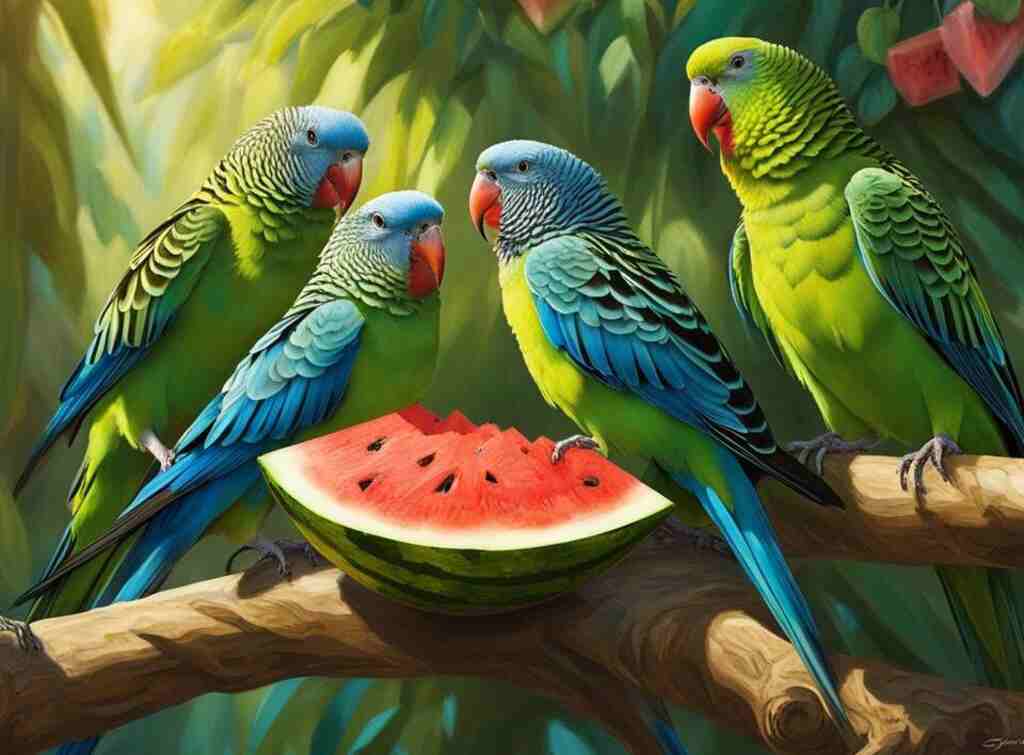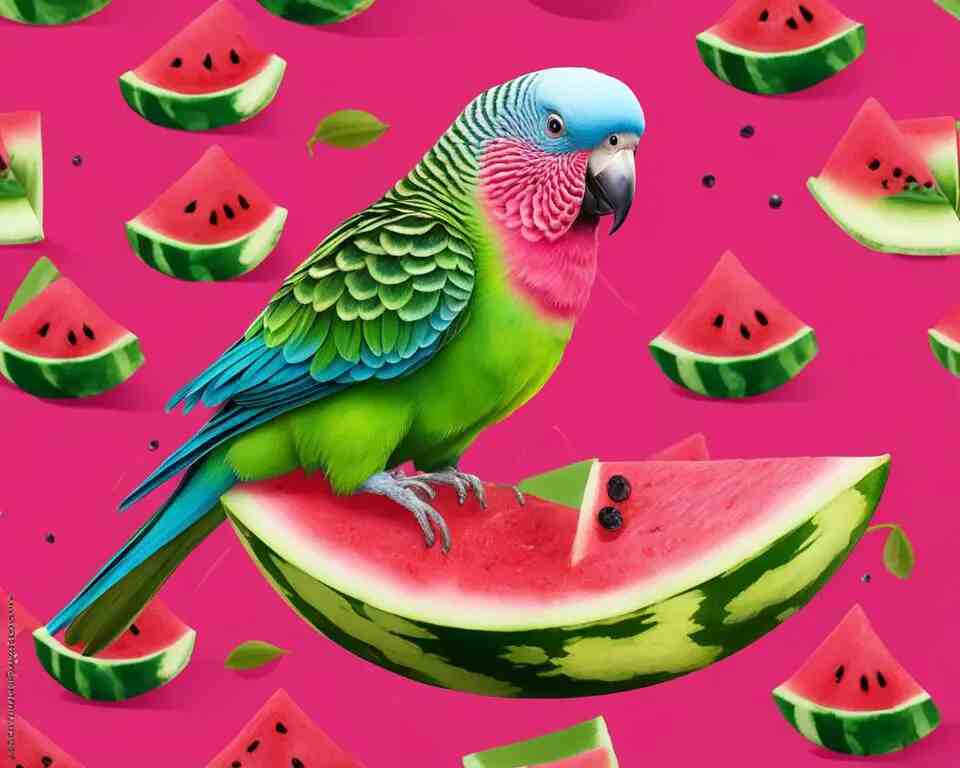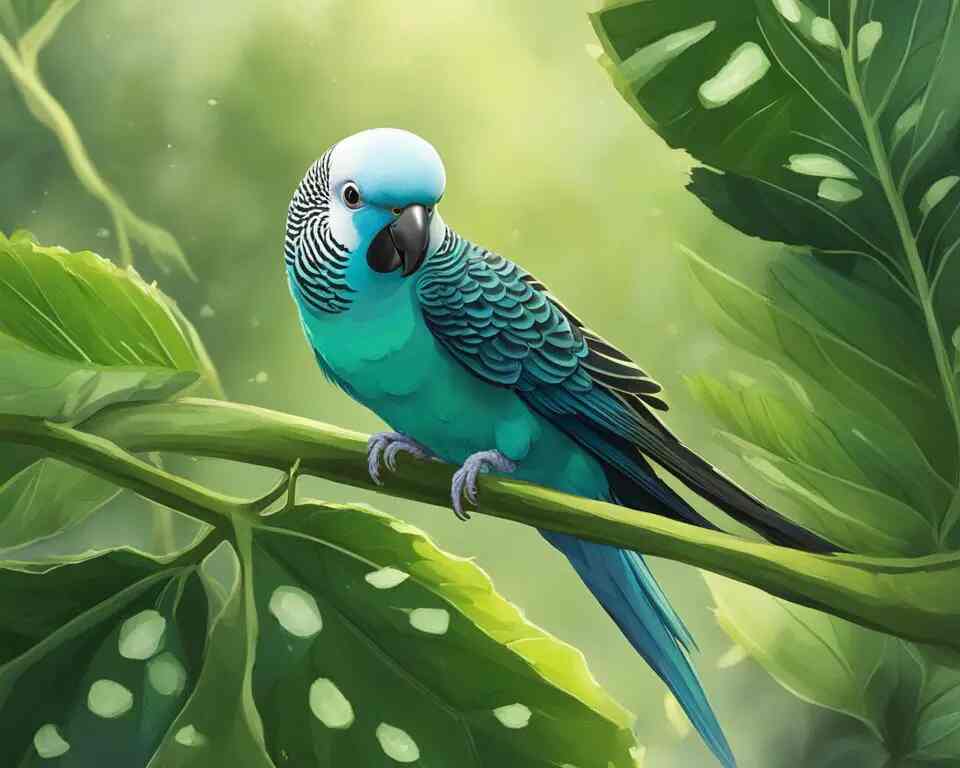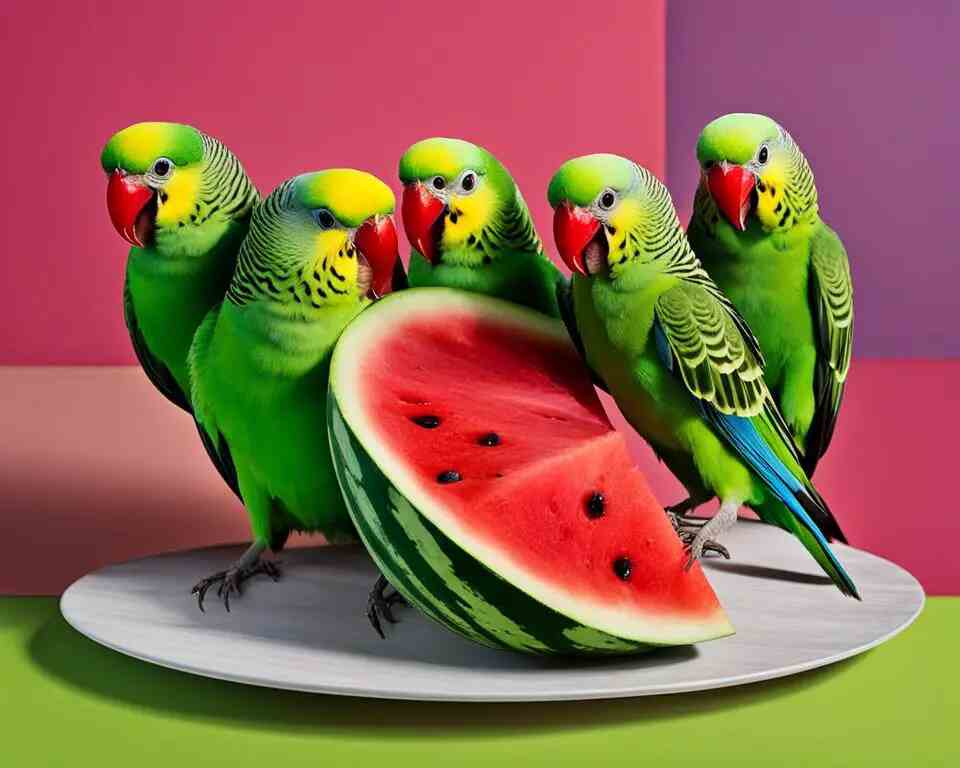I have always been fascinated by the dietary habits of different bird species, and parakeets otherwise known as budgies are no exception. As a proud parakeet owner, I have often wondered if it is safe to feed watermelon to these colorful little birds. In this article, I will explore whether parakeets can eat watermelon, the health benefits of watermelon for parakeets, and how to incorporate watermelon into their diet as a treat.
Feeding watermelon to parakeets can be a topic of debate among bird enthusiasts, as parakeets are mainly grainvores in their natural habitat. Their diet typically consists of seeds, grasses, fruit, nectar from flowers, insects, and their larvae. While it is important to provide a varied diet for optimal health, fruits like watermelon can be included as a treat for parakeets.
Table of Contents
- 1 Key Takeaways:
- 2 Can Parakeets Eat Watermelon?
- 3 What Nuts, Seeds, and Insects Can Parakeets Eat?
- 4 The Importance of Pellets in a Parakeet’s Diet
- 5 Recommended Vegetables for Parakeets
- 6 Suitable Fruits for Parakeets
- 7 Introducing Watermelon into a Parakeet’s Diet
- 8 Providing a Balanced Diet for Parakeets
- 9 Benefits and Precautions of Feeding Watermelon to Parakeets
- 10 Tips for Feeding Watermelon to Parakeets
- 11 Incorporating Watermelon into a Parakeet’s Diet
- 12 Conclusion
- 13 FAQs:
- 13.1 What nuts, seeds, and insects can parakeets eat?
- 13.2 Is watermelon safe for parakeets?
- 13.3 What are the health benefits of watermelon for parakeets?
- 13.4 How can watermelon be incorporated into a parakeet’s diet?
- 13.5 Can you give watermelon seeds to parakeets?
- 13.6 How much watermelon can parakeets eat?
- 13.7 What precautions should be taken when feeding watermelon to parakeets?
- 13.8 How should watermelon be served to parakeets?
- 13.9 Can watermelon be part of a balanced diet for parakeets?
- 14 Source Links
- 15 Author
Key Takeaways:
- Parakeets are mainly grainvores in their natural habitat.
- Fruits like watermelon can be included as a treat in a parakeet’s diet.
- Watermelon provides hydration and vitamins for parakeets.
- It is important to remove any seeds and serve small, bite-sized pieces of watermelon.
- A balanced diet for parakeets includes a mix of seeds, fresh vegetables, and occasional fruits as treats.
Can Parakeets Eat Watermelon?
Yes, parakeets can eat watermelon in moderation. Remove seeds and offer small, bite-sized pieces. Ensure the fruit is fresh and thoroughly washed. Introduce new foods gradually, and monitor for any adverse reactions. Watermelon can be a refreshing and occasional treat for parakeets.
What Nuts, Seeds, and Insects Can Parakeets Eat?
Parakeets have diverse dietary habits and can consume a variety of nuts, seeds, and insects. While these food options provide essential nutrients, it is important to be mindful of what is safe for parakeets to consume. Let’s explore the different options:
Nuts:
Parakeets can safely eat certain nuts in moderation. Some suitable options include acorns and brazil nuts. However, it’s important to note that nuts should be given sparingly due to their high fat content. They can be a healthy and tasty addition to a parakeet’s diet when offered in small quantities.
Seeds:
Seed varieties play a significant role in a parakeet’s diet, as they are primarily grainvores. Parakeets can enjoy a range of seeds, including pumpkin seeds and sunflower seeds. These seeds provide essential nutrients and are a staple food for parakeets. However, it’s crucial to ensure the seeds are free from any additives or preservatives.
Insects:
Parakeets are not only seed eaters but also have an insectivorous side. Some insects, like mealworms, can be included as part of their diet. These protein-rich treats can be a valuable source of nutrition for parakeets. However, it is important to ensure that the insects are of high quality and free from any potential toxins or pesticides.
It’s worth noting that while parakeets can safely consume nuts, seeds, and certain insects, watermelon seeds and rind should be avoided. These seeds can pose a choking hazard and should be removed before offering watermelon to your parakeet.
| Food | Suitable | Quantity |
|---|---|---|
| Nuts (Acorns) | Yes | Small quantities |
| Nuts (Brazil nuts) | Yes | Small quantities |
| Seeds (Pumpkin seeds) | Yes | Staple food |
| Seeds (Sunflower seeds) | Yes | Staple food |
| Insects (Mealworms) | Yes | Occasional treats |
In summary, parakeets can enjoy a variety of nuts, seeds, and insects as part of a balanced diet. These food options provide essential nutrients and can be a valuable source of enrichment for your feathered friend. However, it’s crucial to provide them in moderation and ensure they are of high quality and free from any potential hazards.
The Importance of Pellets in a Parakeet’s Diet
When it comes to the nutrition of parakeets, a well-balanced diet is crucial for their overall health and well-being. While there is an ongoing debate on whether pellets or seeds are better for parakeets, many experts suggest that a combination of both is the ideal approach.
Pellets are specially formulated to meet the unique dietary needs of parakeets. They are fortified with vitamins, minerals, and essential amino acids, which are important for maintaining healthy feathers, strong bones, and a robust immune system.
However, it’s important to note that pellets should not be the sole source of nutrition for parakeets. Fresh vegetables, fruits, and nuts should also be incorporated into their diet to provide additional variety and natural enrichment.
In fact, parakeets can enjoy a wide range of parakeet-friendly fruits and vegetables, including watermelon, as part of their dietary rotation.
| Parakeet-Friendly Fruits | Parakeet-Friendly Vegetables |
|---|---|
| Apples | Bok Choy |
| Bananas | Broccoli |
| Grapes | Carrots |
| Oranges | Celery |
| Pears | Cucumber |
| Strawberries | Kale |
| Watermelon | Peas |
When incorporating watermelon into your parakeet’s diet, it’s important to serve it in small quantities. Watermelon can be a hydrating and refreshing treat for your feathered friend, but due to its high sugar content, it should be regarded as an occasional indulgence. Always remove any seeds and cut the watermelon into small, bite-sized pieces for easy consumption.
Remember, every parakeet is unique, and their dietary preferences and needs may vary. It’s essential to monitor your parakeet’s reaction to new foods and consult with a veterinarian for specific dietary recommendations.
By providing a varied and balanced diet that includes pellets, fresh vegetables, fruits, and occasional treats like watermelon, you can ensure that your parakeet’s nutritional needs are met, promoting their overall health and happiness.
Recommended Vegetables for Parakeets
When it comes to incorporating vegetables into a parakeet’s diet, there are plenty of options to choose from. Vegetables provide essential vitamins, minerals, and fiber that contribute to a balanced and nutritious diet for these colorful birds. Here are some recommended vegetables that you can include in your parakeet’s meal plan:
Bok Choy
Bok choy is a leafy green vegetable that is rich in vitamins A, C, and K. It also contains calcium and iron, which are important for bone health and blood production. Chop bok choy into small pieces to make it easier for your parakeet to consume.
Broccoli
Broccoli is a cruciferous vegetable that is packed with vitamins A, C, and K. It also contains folate and fiber, making it a nutritious addition to your parakeet’s diet. Steam or boil the broccoli until it is soft and then chop it into small, bite-sized pieces.
Carrots
Carrots are an excellent source of beta-carotene, which is converted into vitamin A in the body. This vitamin promotes good vision and a healthy immune system. Grate or thinly slice carrots to make them easier for your parakeet to eat.
Celery
Celery is a hydrating vegetable that is low in calories and high in fiber. It also provides vitamins A, C, and K. Cut celery into small pieces to prevent choking hazards and diarrhea and offer it in very small quantites as a crunchy treat for your parakeet.
Cucumber
Cucumbers are refreshing and hydrating vegetables that are a great source of vitamins K and C. They also have a high water content, which can help keep your parakeet hydrated. Slice cucumbers into small rounds or thin strips for easy consumption.
Kale
Kale is a nutrient-dense vegetable that is rich in vitamins A, C, and K. It also contains antioxidants and fiber. Remove the tough stems and chop the kale into small pieces before serving it to your parakeet.
Peas
Peas are a good source of vitamins A, C, and K, as well as fiber. They can be served fresh or frozen and should be lightly steamed to make them easier for your parakeet to digest. Offer peas as a tasty and nutritious treat only in moderation.
Spinach
Spinach is a leafy green vegetable that is loaded with vitamins A, C, and K. It also provides iron and folate. Chop spinach into small pieces and mix it with other vegetables or fruits to entice your parakeet to eat it.
Table: Recommended Vegetables for Parakeets
| Vegetable | Vitamins | Health Benefits |
|---|---|---|
| Bok Choy | A, C, K | Bone health, blood production |
| Broccoli | A, C, K | Nutrient-dense, immune support |
| Carrots | A | Vision, immune support |
| Celery | A, C, K | Hydration, fiber |
| Cucumber | K, C | Hydration, vitamins |
| Kale | A, C, K | Antioxidants, fiber |
| Peas | A, C, K | Nutrition, fiber |
| Spinach | A, C, K | Nutrient-dense, iron |
These vegetables can be served alongside other foods in your parakeet’s diet, such as seeds, pellets, and fruits. It’s important to note that some parakeets may have preferences when it comes to vegetables, so feel free to experiment with different options to find what your feathered friend enjoys the most. Remember to wash all vegetables thoroughly before serving them to remove any pesticides or dirt.
By incorporating a variety of vegetables into your parakeet’s diet, you can help provide them with the necessary nutrients for optimal health and well-being. As with any dietary changes, it’s best to introduce new vegetables gradually and monitor your parakeet’s response. Enjoy watching your parakeet explore and enjoy the colorful world of vegetables!
Suitable Fruits for Parakeets
Parakeets can enjoy a variety of fruits as part of their diet. While fruits should be given in small quantities due to their high sugar content, they can provide essential vitamins and minerals to keep your parakeet healthy. One suitable fruit option for parakeets is watermelon.
Watermelon is a hydrating and refreshing treat for parakeets. It contains high water content, which helps maintain proper hydration levels. Additionally, watermelon is a good source of vitamins A and C, both of which are beneficial for your bird’s overall health.
When offering watermelon to your parakeet, it is important to remove any seeds and serve small, bite-sized pieces. This prevents choking hazards and makes it easier for your parakeet to consume. Remember to incorporate watermelon as a treat rather than a staple in their diet to maintain a balanced nutritional intake.
Summary:
- Parakeets can enjoy a variety of fruits in moderation.
- Watermelon is a suitable fruit option for parakeets.
- Watermelon is hydrating and contains vitamins A and C.
- Remove seeds and serve small, bite-sized pieces of watermelon to your parakeet.
Introducing Watermelon into a Parakeet’s Diet
When it comes to incorporating watermelon into a parakeet’s diet, it’s important to do it gradually and carefully. Start by serving small quantities of watermelon and observe your parakeet’s reaction. Some parakeets may take some time to adjust to the new taste and texture of watermelon, so patience is key.
To make it easier for your parakeet to consume watermelon, you can mix it with other fruits and vegetables, or even incorporate it into a mash with seeds and pellets. This will provide a balanced combination of nutrients and flavors for your feathered friend. Remember to remove any seeds from the watermelon before serving it, as they can be a choking hazard for parakeets.
When offering watermelon to your parakeet, it’s best to serve it in small, bite-sized pieces. This makes it easier for them to handle and consume. Additionally, make sure to choose ripe watermelons without any mold or signs of spoilage. Thoroughly wash the watermelon before serving to remove any dirt or residue.
| Fruit | Serving Size |
|---|---|
| Watermelon | Small, bite-sized pieces |
| Apples | Sliced or diced |
| Grapes | Cut into small bunches |
By gradually introducing watermelon into your parakeet’s diet and following these serving guidelines, you can provide them with a refreshing and hydrating treat. Watermelon is a great source of hydration and contains vitamins A and C, which are beneficial for your parakeet’s overall health. Just remember to offer it in moderation, as watermelon does have a high sugar content.
So, the next time you enjoy a slice of watermelon, why not share a small piece with your feathered companion? They’ll appreciate the tasty and nutritious addition to their diet.
Providing a Balanced Diet for Parakeets
In order to ensure optimal health for your parakeet, it is important to provide a balanced diet that includes a variety of nutrients. A well-balanced diet consists of a mix of seeds or pellets, fresh vegetables, and occasional fruits as treats. By incorporating watermelon into your parakeet’s diet, you can provide necessary hydration and add some vitamins to their meals.
Seeds or pellets should make up approximately 60% of your parakeet’s diet. These can be easily found at pet stores and provide essential nutrients. Fresh vegetables should make up the remaining 40%, providing fiber, vitamins, and minerals. Some vegetables that are suitable for parakeets include bok choy, broccoli, carrots, celery, cucumber, kale, peas, and spinach.
When it comes to fruits, including watermelon, they should be given in small quantities. Fruits have a high sugar content and should be regarded as treats rather than a staple part of their diet. Watermelon can be a refreshing and hydrating treat for your parakeet, but remember to remove any seeds and serve small, bite-sized pieces.
Table: Balanced Diet for Parakeets
| Food Group | Percentage of Diet | Examples |
|---|---|---|
| Seeds or Pellets | 60% | Sunflower seeds, parakeet pellets |
| Fresh Vegetables | 40% | Bok choy, broccoli, carrots, spinach |
| Occasional Fruits | As treats | Watermelon, apples, grapes |
By following this balanced diet, you can ensure that your parakeet gets all the necessary nutrients for a healthy and happy life. Remember to consult with a veterinarian if you have any concerns about your parakeet’s diet or if you are introducing new foods into their routine.
Benefits and Precautions of Feeding Watermelon to Parakeets
Watermelon can offer several benefits to parakeets when included in their diet in moderation. Here are some of the advantages:
- Hydration: Watermelon contains a high water content, which can help keep your parakeet hydrated. This is especially important during hot summer months or in dry climates.
- Nutritional Value: Watermelon is rich in vitamins A and C, which are essential for the overall health and immune function of parakeets.
- Treat Option: Offering small pieces of watermelon as an occasional treat can provide enrichment for your parakeet, allowing them to enjoy different flavors and textures.
While watermelon can be beneficial for parakeets, there are precautions that need to be taken:
- Sugar Content: Watermelon contains natural sugars, so it should be given in moderation to prevent weight gain and other potential health issues.
- Seed Removal: It is crucial to remove all seeds from the watermelon before feeding it to your parakeet. Seeds can be a choking hazard and may cause digestive problems.
- Small Pieces: Cut the watermelon into small, bite-sized pieces that are easy for your parakeet to consume. This reduces the risk of choking and helps with portion control.
By following these precautions and incorporating watermelon into your parakeet’s diet mindfully, you can safely offer them a refreshing and nutritious treat.
Table: Watermelon Nutritional Information
| Nutrient | Per 100g |
|---|---|
| Calories | 30 |
| Carbohydrates | 7.6g |
| Fiber | 0.6g |
| Vitamin A | 569 IU |
| Vitamin C | 8.1mg |
| Potassium | 112mg |
Tips for Feeding Watermelon to Parakeets
When it comes to feeding watermelon to parakeets, there are a few important tips to keep in mind. By following these guidelines, you can ensure that your feathered friend enjoys this tasty treat safely and without any issues.
1. Choose Ripe Watermelons
Before offering watermelon to your parakeet, make sure to choose ripe watermelons that are free from any mold or signs of spoilage. Ripe watermelons are not only more flavorful, but they also offer the best nutritional value for your bird.
2. Thoroughly Wash the Watermelon
Prior to serving, it is essential to thoroughly wash the watermelon to remove any dirt or potential pesticides. This step helps ensure that your parakeet enjoys a clean and safe snack.
3. Remove Seeds and Serve Bite-Sized Pieces
Parakeets should never be given watermelon seeds as they can be a choking hazard. Before offering watermelon to your bird, make sure to remove all seeds. Additionally, to make it easier for your parakeet to consume, cut the watermelon into small, bite-sized pieces.
4. Monitor Your Parakeet’s Reaction
Every parakeet is unique, and their reactions to new foods can vary. When introducing watermelon to your bird’s diet, monitor their reaction closely. Pay attention to any changes in behavior or digestion. If you notice any negative reactions, such as stomach upset or diarrhea, it is best to consult with a veterinarian.
Feeding watermelon to parakeets can be a fun and nutritious experience. Just remember to follow these tips to ensure your bird’s safety and enjoyment. By offering watermelon as a treat in moderation, you can provide your parakeet with a refreshing and hydrating snack that they are sure to love.
| Tips for Feeding Watermelon to Parakeets |
|---|
| 1. Choose Ripe Watermelons |
| 2. Thoroughly Wash the Watermelon |
| 3. Remove Seeds and Serve Bite-Sized Pieces |
| 4. Monitor Your Parakeet’s Reaction |
Incorporating Watermelon into a Parakeet’s Diet
When it comes to a parakeet’s diet, incorporating watermelon can be a refreshing and hydrating treat. Watermelon contains high water content, which helps to keep your parakeet properly hydrated. Additionally, it provides essential vitamins, including vitamin A and vitamin C, which contribute to their overall health.
However, it’s important to remember that watermelon should be given in moderation due to its high sugar content. Feeding too much watermelon can lead to excessive sugar intake, which may negatively impact your parakeet’s health.
To introduce watermelon into your parakeet’s diet, it’s advisable to start with small quantities and observe their reactions. Mix watermelon with other fruits and vegetables or incorporate it into a mash with seeds and pellets.
This will help your parakeet adjust to the new taste and texture of watermelon. It’s also crucial to remove any seeds from the watermelon before serving it to your pet. Small, bite-sized pieces are recommended for easy consumption.
A balanced diet for your parakeet should consist of a combination of seeds or pellets, fresh vegetables, and occasional fruits as treats. Watermelon can be included as part of this balanced diet, providing necessary hydration and essential vitamins.
However, it’s crucial to remember that watermelon should not replace the main components of their diet. The majority of their nutrition should come from seeds or pellets and fresh vegetables. Watermelon should be regarded as a supplemental treat rather than a staple food.
| Fruits for Parakeets | Vegetables for Parakeets |
|---|---|
| Apples | Bok Choy |
| Bananas | Broccoli |
| Grapes | Carrots |
| Oranges | Kale |
| Pears | Peas |
| Strawberries | Spinach |
| Watermelon (in moderation) |
Note: It’s important to cut fruits and vegetables into small or shredded pieces to accommodate the smaller beaks of parakeets.
Overall, incorporating watermelon into a parakeet’s diet can be a healthy and enjoyable addition, as long as it is given in moderation. It’s crucial to maintain a balanced diet that includes a variety of seeds, pellets, fresh vegetables, and occasional watermelon treats. By providing a varied and nutritious diet, you can ensure the optimal health and well-being of your parakeet.
Conclusion
After exploring various aspects of a parakeet’s diet and the role watermelon can play, it is clear that watermelon can be safely incorporated into a parakeet’s diet. While it should be given in moderation due to its high sugar content, watermelon can provide a refreshing and hydrating treat for these colorful birds.
When offering watermelon to parakeets, it is important to remember a few key points. Ensure that the watermelon is ripe and free from any signs of spoilage. Thoroughly wash the fruit before serving, and remove any seeds to prevent choking hazards. It is also recommended to cut the watermelon into small, bite-sized pieces for easy consumption.
However, it is crucial to maintain a balanced diet for parakeets by incorporating other fruits and vegetables along with seeds or pellets. By providing a varied diet, parakeets can receive the necessary nutrition for their overall health and well-being. Remember to always monitor your parakeet’s reaction to new foods and adjust the quantity accordingly.
In conclusion, including watermelon as part of a balanced parakeet diet can provide both nutrition and enjoyment for these delightful pets. By following these guidelines and ensuring moderation, parakeet owners can offer their feathered friends a tasty and healthy treat while maintaining their optimal health.
FAQs:
What nuts, seeds, and insects can parakeets eat?
Parakeets can eat a variety of nuts and seeds such as acorns, brazil nuts, pumpkin seeds, and sunflower seeds. They can also consume insects like mealworms.
Is watermelon safe for parakeets?
Watermelon is safe for parakeets to eat in moderation. However, it should be given without seeds and in small, bite-sized pieces.
What are the health benefits of watermelon for parakeets?
Watermelon provides hydration for parakeets due to its high water content. It also contains vitamins A and C.
How can watermelon be incorporated into a parakeet’s diet?
Watermelon can be served as a refreshing treat for parakeets in small quantities. It can be mixed with other fruits and vegetables or incorporated into a mash with seeds and pellets.
Can you give watermelon seeds to parakeets?
Watermelon seeds should be avoided when feeding parakeets. It is important to remove any seeds before serving watermelon to them.
How much watermelon can parakeets eat?
Parakeets should only be given small quantities of watermelon due to its high sugar content. It should be regarded as a treat and not a main part of their diet.
What precautions should be taken when feeding watermelon to parakeets?
When feeding watermelon to parakeets, it is important to choose ripe watermelons without any signs of spoilage or mold. The watermelon should be washed thoroughly, and any seeds should be removed before serving.
How should watermelon be served to parakeets?
Watermelon should be cut into small, bite-sized pieces for easy consumption by parakeets. These pieces can be served alongside their regular diet.
Can watermelon be part of a balanced diet for parakeets?
Yes, watermelon can be included as part of a balanced diet for parakeets. It should be given in small quantities as a treat, alongside a mix of seeds or pellets and fresh vegetables.





